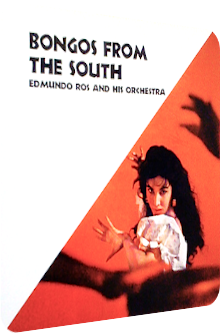
Edmundo Ros
Bongos From The South
1961
The Trinidadian-British orchestra conductor Edmundo Ros (1910–2011) gives in to one particular shtick that lost its status as an abhorrent peculiarity in the late 50’s and early 60’s: albums full of bongos and other drum-related instruments are the latest rad back in those days, with each and every larger Jazz label trying to cash in on the percussion craze. You easily recognize these albums due to their signal terms such as Percussion, Drums or, well, Bongos. Edmundo Ros’ take on the formula features orchestral settings that are centered around the bongos; or so it seems, as the bongos are indeed prominently interwoven, but not as important a part as the title might suggest.
Bongos From The South is an eminently interesting work in this regard and others, released in 1961 on London Records as part of their Phase 4 Stereo series that is keen on using the latest recording equipment in order to offer the greatest listening experience in the whole universe. One has heard that before time and again, be it on Enoch Light‘s Command Records or the smaller Directional Sound competitor. However, as I keep saying, these albums have an aesthetic quality that outshines the stereo-related advancements, and this is also applicable in terms of Bongos From The South. The orchestra is fully equipped, with lots of mallet instruments, horns, flutes and tropical percussion artifacts being dropped in each and every arrangement. The usual 12 tracks are featured, almost all of them situated in a specific country or location, making Bongos From The South an aural travelog. But it is a tad more than that: it teaches the listener a lesson in terms of his or her perceived notions regarding the term South or Southern. What seems Southern to me might be far up North to you. So what is Edmundo Ros’ concept, and why are there so many North American cuts on this release? The answer is given over the course of this review.
Deep In The Heart Of Texas by big band maestro Don Swander does not provide the most exotic locale one could think of, but in the hands of Edmundo Ros, things at least turn cheeky and sun-kissed, although he does not change much of Swander’s sheet music, I have to admit. The transmutation into something tropical does work really well. The four-note scheme as played by the brass instruments – with the last note being stressed as a memorable marker – works really well, and the mobbed up Crime Jazz horns, warbled fifes and glockenspiels further taking the focus away from a mere Texan ditty. Timpani, triangles and greenish bongos round off a strikingly Latinized piece, with many more to follow, such as Amadeu do Vale’s, José Galhardo’s and Raúl Portela’s Exotica classic Lisbon Antigua which gets the tonewood treatment via clave-based capsules. In other news, the downwards spiraling vibraphone offers mysticism, the Flamenco guitar boosts the perceived heat, and last but not least, the occasionally antagonistic fusillades of the brass players serve as short bursts of joy. Lisbon Antigua appears to be so vivid due to its well-balanced setting which allows the bongos to shine and guarantees moments of quiescence to unfold.
Lady Of Spain by Robert Hargreaves, Stanley Damerell and Henry B. Tilsley meanwhile unleashes cavalcades of castanets, sweeping timbales plus kettle drums of all kinds and interweaves them into a vista that oscillates between majesty and heated devotion, whereas Ernesto Lecuona’s La Comparsa leads back to the jungle via a bongo-infested trail, a legato lead trombone and a flute-accentuated loftiness. Leaving civilization even farther behind – just kidding! – with Stephen Foster’s My Old Kentucky Home and its porches full of banjo players, uncharacteristic marimba blebs and a frantic bongo thicket that steals the whole show, the interim end comes in the shape of Ary Barroso’s Brazil, and Edmundo Ros takes this classic seriously. After a show tune-like opener and glaringly gleaming horns of insouciance, the main melody is played on a flute, is backed by a glistening nylon string guitar and rounded off by saltatory marimba fireflies. A great and fast interpretation with a strong carnival feeling.
Side B launches with an atypical choice: the traditional When The Saints Go Marching In. Still, the chintziness of this all too well-known piece serves as a very good fundament for experimentation. Edmundo Ros unchains his large-grained maracas, multitudinous drums and a post-Prohibition era echopraxia brass-wise. The result is tropicalized and tropified, with the lead melody still embarrassingly recognizable. Edgar Leslie’s and Joe Burke’s Moon Over Miami then proves to be a primetime showstopper; fittingly nocturnal thanks to whitewashed flutes, fragile backing guitars and a slowly increasing bongo aorta, it is the placidity in the background with the reverberated vibes and claves that augment the feeling of standing on a moonlit balcony in Miami. Johann Strauss Jr.’s Roses From The South is even more vitreous than Moon Over Miami, but at the same time more pointillistic. Its woodpecker marimbas, 3/4 Waltz structure and convivial flutes are too chintzy for my taste, so much so that the multiplexed horns become the big boon of the arrangement.
An Exotica gold standard follows with Margarita Lecuona’s Taboo. And blimey, Ros finally achieves a truly remarkable capsule of distinction, letting Taboo appear as if it came from another world or album. Pitch-black threnody is fueled by lamenting horns and an omnipresent hollowness of the bongos. The parallax layers are so porous that they even allow the listener to absorb the double bass specters. Only the last third becomes a tad more propitiatory in a delightfully dark timespan of 160 seconds. While Joe Young’s, Mabel Wayne’s and Sam Lewis’s In A Little Spanish Town extrapolates the sunbeams and offers a wondrously hectic and bubbling carnival atmosphere with tachycardia-causing bongos, pompous brass fanfares and a storm of castanets, the finale El Cumbanchero by Rafael Hernández is equally fast, but much more ritualistic, tribal and pure thanks to its whirling flutes, the verdured wall of drums and the spread out Crime Jazz counterparts. This is one bumpy jungle ride, leading into the abyss… for the album is over.
One thing is for sure after listening to Edmundo Ros’ Bongos From The South: this travelog plays with the listener’s expectations and geographic knowledge. The material Ros chose gets very specific and pinpoints where it takes place, even if titles such as Brazil do not tell the erudite connoisseur anything at all, since this is a large country with many different locations and temperature zones. But anyway, what I am hinting at is the concept of the South, as there is always a “Southern direction” wherever you go. Depending on where the listener is situated, titles like My Old Kentucky Home or the opener Deep In The Heart Of Texas may seem horribly wrong in this context. “These are not exotic states, they’re our homes!” Ros is aware of this and gives them the treatment they deserve in the intrinsic context: alienating their clichéd base frames just enough so that the melodies are eminently recognizable and Western while they experience synergetic (ex)changes that come from the South.
Notwithstanding the fact that countries like Spain are situated East from the United States, Edmundo Ros’ concept of the South is driven by the aesthetics of the sun… and Latin horns. Compositions like Moon Over Miami and especially so Taboo are languorous exceptions, oases of pipe dreams awash with moonlight. Soon enough though, the temperature rises, the luminescence adds a few Candela and the tempo increases mercilessly, with El Cumbanchero being the endpoint of a sunny voyage. The bongos are not as mercilessly upfront and centered as in Don Ralke’s The Savage And The Sensuous Bongos and its sibling But You’ve Never Heard Gershwin With Bongos (both 1960) or many an album with the term Percussion in its title, but this could well be seen as a feature. They are quasi-ubiquitous, just not thrown doen the listener’s throat. Bongos From The South is available in its original vinyl form and in a remastered digital incarnation.
Exotica Review 364: Edmundo Ros – Bongos From The South (1961). Originally published on Aug. 2, 2014 at AmbientExotica.com.
